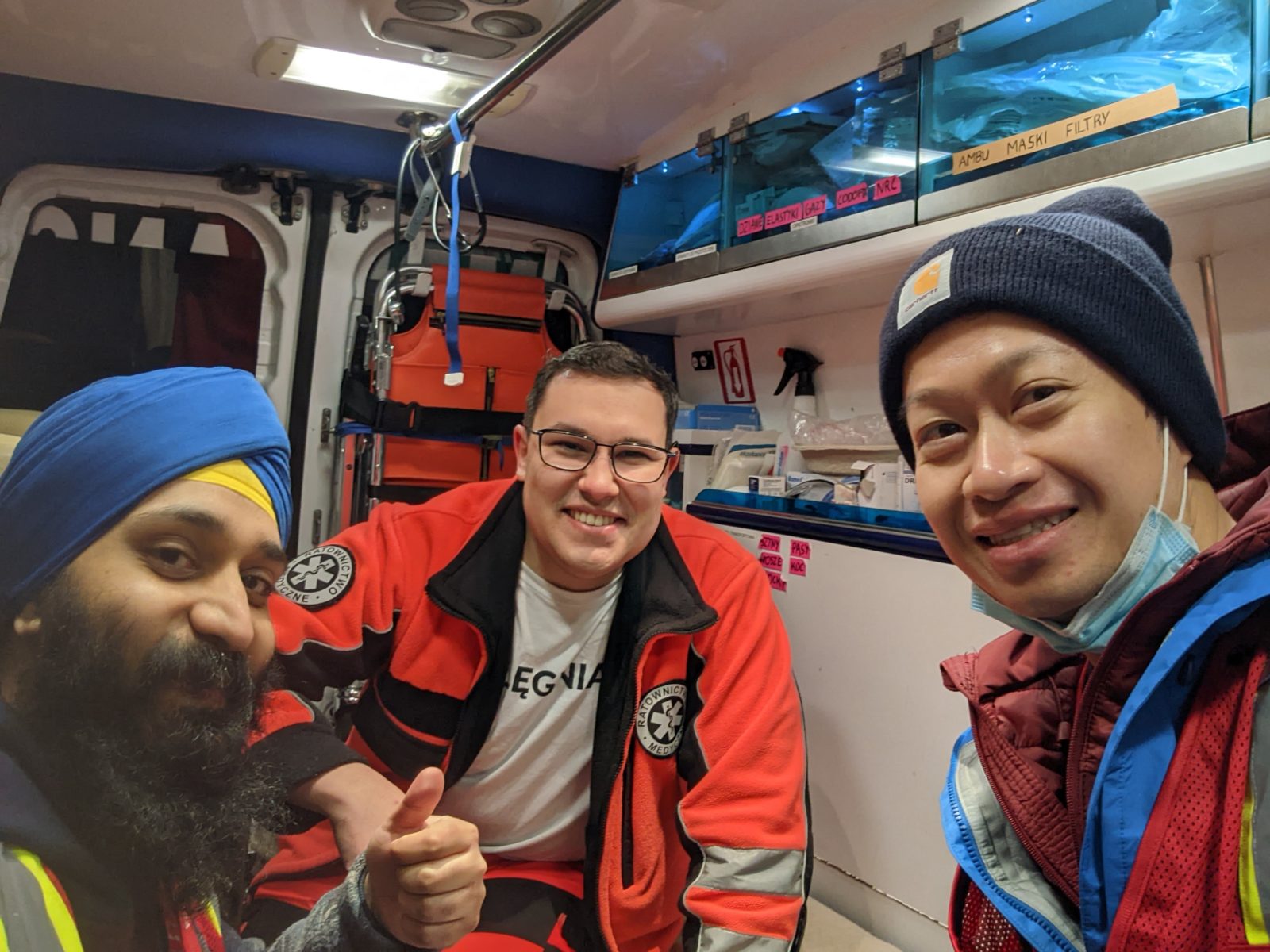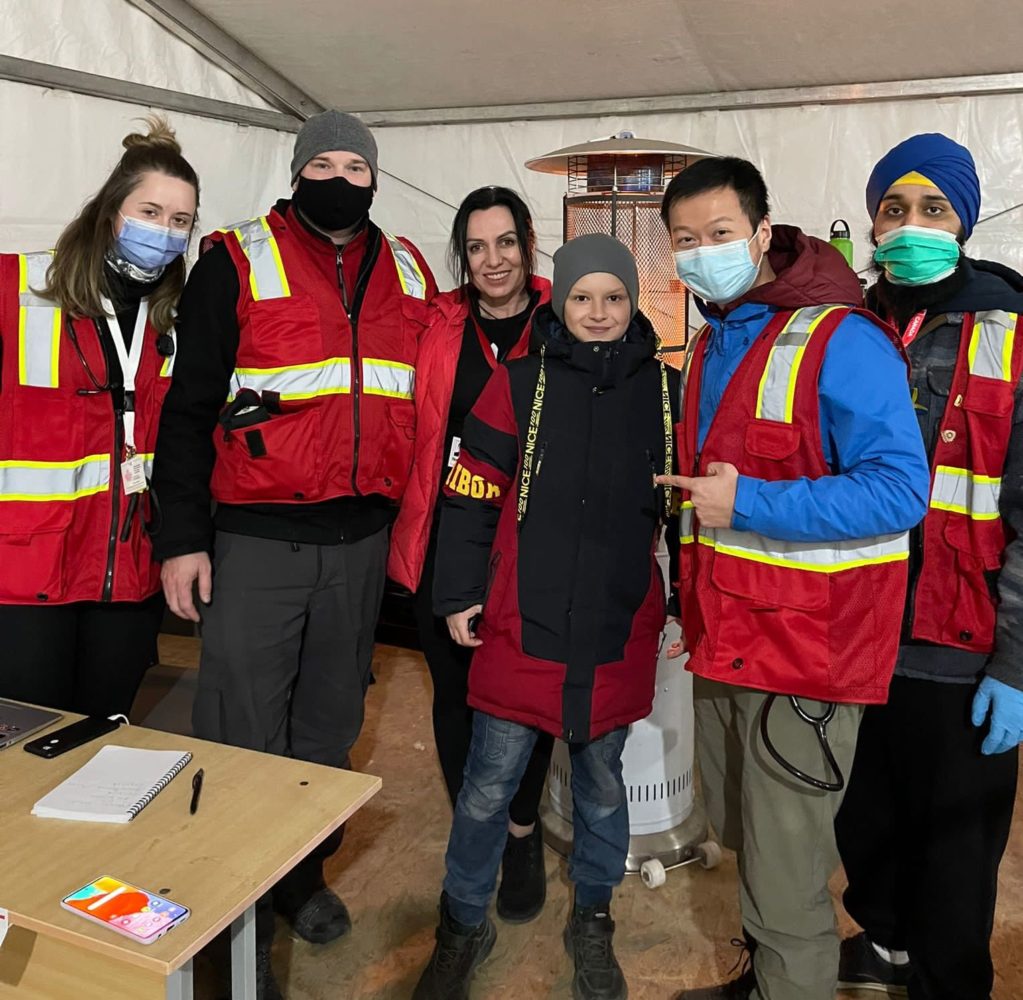Editor’s note: Anthony Fong is a physician volunteer with Canadian Medical Assistance Teams, a non-profit disaster relief organization, providing medical aid to Ukrainian refugees along the Poland-Ukraine border.
I am a Canadian emergency physician in Ukraine, just inside the border with Poland, here to treat Ukrainian refugees fleeing the full-scale invasion of their country. I’m part of a team of volunteer doctors, nurses, a paramedic, an interpreter, a psychologist and logistics personnel representing Canadian Medical Assistance Teams (CMAT), a disaster-response non-governmental organization.
We are at Korczowa-Krakovets, a border crossing between Ukraine and Poland. On the Ukrainian side, the crossing is near the town of Krakovets; on the Polish side, it is the village of Korczowa.
Tonight is my first 12-hour shift at Krakovets –just 12 hours ago, our clinic didn’t exist at all. Installed by CMAT’s day-shift team in a previously unused corner of a large white welcome tent, the clinic is the last stop for health care before refugees cross into Poland on foot.
 Gathering for warmth in the clinic. Left to right: Jordan Lenz, a pediatric emergency nurse, from London, Ont.; Polish nurse Paula Dominika Leznicka; Nataliya Halych (hidden from view; an interpreter from Toronto); and Ameek Singh Bali, a nurse from Toronto.
Gathering for warmth in the clinic. Left to right: Jordan Lenz, a pediatric emergency nurse, from London, Ont.; Polish nurse Paula Dominika Leznicka; Nataliya Halych (hidden from view; an interpreter from Toronto); and Ameek Singh Bali, a nurse from Toronto.
While there is considerable risk in working on the Ukrainian side, it is a necessity as that’s where the bottleneck is. Just a week ago, six refugees died of cold exposure and heart problems at another crossing when the wait time reached 30 hours.
As we drive to the site just after sunset, our van’s Polish volunteer driver, Izabela, turns on a flashing blue light on the dashboard and switches lanes to the other side of the highway, in the direction of oncoming traffic.
“We can do this only because we’re humanitarian,” she says.
While the vehicle lineup to the border crossing into Poland extends a few kilometres, pedestrians can cross in less than an hour.
Refugees are dropped off in vehicles from all over Ukraine, especially eastern regions such as Kharkiv and Donetsk. Others escape to western regions of Ukraine such as Lviv to wait out the war – a trend that may soon change in light of recent rocket attacks there.
We are told by a Polish NGO medical co-ordinator that the night shift is busy here and that most people needing medical care show up between 6 p.m. and 2 a.m.
However, the tent is sparsely populated right now. There are a few families huddling in blankets around vertical propane heaters. An elderly Ukrainian woman is singing folk songs on the phone to her music students while serving borscht and chicken groats, a hearty, multi-grain porridge. It’s delicious.
In the meantime, our focus is on unpacking medications and arranging them into categories that make sense. Over-the-counter pain and fever medications, antacids and antibiotics are the most needed. Oxygen tanks, airway equipment and IV start kits are in the ambulance parked 50 metres away. I brought tourniquets and trauma shears from Vancouver.
Brandon Duncan, a pediatric emergency nurse from London, Ont., troubleshoots the infra-red thermometer and automatic blood pressure cuff, neither of which seems to work right now because of the cold.
Meanwhile, I set up a laptop and orient myself to the electronic medical record software that we’ll use for the first time tonight.
Nataliya Halych, our interpreter from Toronto, writes on a large piece of paper “Medical Assistance Point” in Ukrainian and tapes it to our table.
Tonight, it feels like the biggest challenge isn’t medical – it’s staying warm. As the temperature dips to -4 C, being exposed to it for just a few hours gives me a sample of the harsh conditions in which earlier waves of refugees had to wait. With the ravages of war on their heels, many in the lineup would rather suffer hypothermia than lose their place in line.
 From the ambulance parked 50 metres from the clinic. Left to right: Ameek Singh Bali; Polish nurse Gilbert Kolbe; and Anthony Fong.
From the ambulance parked 50 metres from the clinic. Left to right: Ameek Singh Bali; Polish nurse Gilbert Kolbe; and Anthony Fong.
But tonight, it seems the volume has reduced to a trickle of a few dozen from occasional buses that arrive about once an hour.
A young mother and her three school-aged children from Sumy show up around midnight. Nauseated from nearly 1,000 kilometres of bus rides, she asks us to treat their motion sickness before they cross the border.
She looks emotionally worn, but her children’s smiles are so uplifting I can hardly tell they’ve been through a war zone. Nataliya hands each child a tiny Canadian flag.
We give them each a dose of dimenhydrinate, a nausea drug, and tell their mom it’ll make them sleepy. “All the better,” she replies, with a look of relief. Within minutes, the whole family is guided past the tent to the border.
On the Polish side, they will be quickly ushered into buses and moved into temporary homestays and reception centres in nearby cities – a systematic and unprecedented gesture of accommodation by Poland, whose population of 38 million has taken in more than 2.1 million refugees in just weeks.
Others seen at the clinic are sicker. Just hours ago, my colleagues on day shift cared for a 69-year-old Ukrainian woman who had fainted in the lineup. Too unwell to walk, she was started on IV fluids and two on-call Polish nurses evacuated her by ambulance to a hospital.
One of the nurses, 25-year-old Gilbert Kolbe, is still sitting in the ambulance; committed to a 24-hour shift, he’ll sleep in it tonight. During the week, Kolbe works two jobs, studies to become an ICU nurse and volunteers in Ukraine on weekends.
He says the past three weeks have been “full of change, terrifying moments and very bad times.”
Kolbe recalls difficult scenes of family separations, the men remaining in Ukraine and women and children moving on to Poland. “There are a lot of these families. It’s very hard to watch (them say goodbye) — I can’t imagine how they feel.”
When asked about the danger of crossing into Ukraine to help, Kolbe says without hesitation: “I’m not scared of bombs. I’m not scared of war. I became a nurse for a reason.”
 All good to go. Left to right: Jordan Lenz; Brandon Duncan; Nataliya Halych; an 11-year-old boy from Sumy, Ukraine, treated by the group; and Ameek Singh Bali.
All good to go. Left to right: Jordan Lenz; Brandon Duncan; Nataliya Halych; an 11-year-old boy from Sumy, Ukraine, treated by the group; and Ameek Singh Bali.
Cover photo: Elderly women volunteer gives singing lesson over the phone while serving borscht.
Photos courtesy of Anthony Fong.


The comments section is closed.